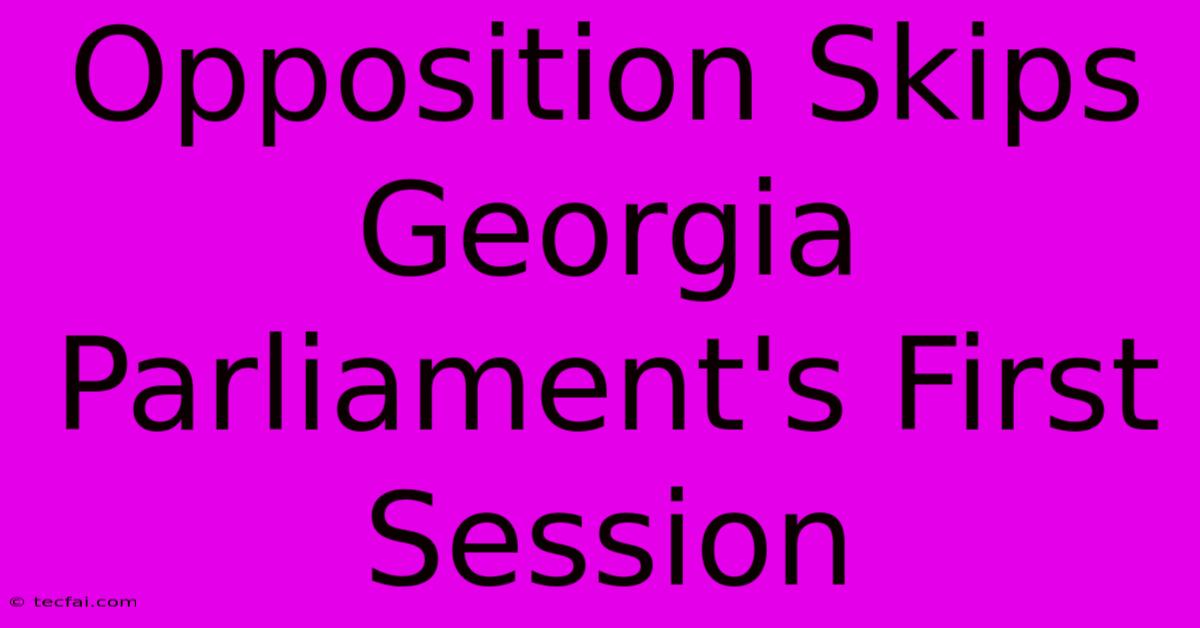Opposition Skips Georgia Parliament's First Session

Discover more detailed and exciting information on our website. Click the link below to start your adventure: Visit Best Website tecfai.com. Don't miss out!
Table of Contents
Opposition Skips Georgia's Parliament First Session: A Deep Dive into the Political Standoff
Georgia's political landscape is experiencing significant turbulence following the ruling Georgian Dream party's decisive victory in the recent parliamentary elections. The opposition's dramatic boycott of the parliament's first session marks a significant escalation of the ongoing political standoff, raising serious questions about the future of the country's democratic trajectory. This article will delve into the reasons behind the opposition's actions, analyze the potential consequences, and explore the implications for Georgia's international standing.
The Opposition's Rationale: A Claim of Unfair Elections
The opposition parties, notably the United National Movement (UNM) and several smaller groups, have consistently denounced the October 2024 elections as fundamentally flawed and undemocratic. Their claims center around allegations of widespread voter intimidation, ballot stuffing, and manipulation of the electoral process. They argue that the Georgian Dream party, led by Bidzina Ivanishvili, abused its power to secure a victory that doesn't reflect the true will of the Georgian people. This narrative is further fueled by a lack of international observer consensus on the fairness of the election, with reports highlighting inconsistencies and concerns. The opposition's refusal to participate in the first parliamentary session is a direct manifestation of their belief that the legitimacy of the current parliament is severely compromised.
Key Arguments from the Opposition:
- Lack of Transparency: Allegations of irregularities in vote counting and a lack of transparency in the electoral process dominate the opposition's arguments.
- Voter Intimidation: Reports of intimidation tactics aimed at discouraging opposition voters have been widely circulated, further eroding trust in the electoral process.
- International Concerns: The opposition points to concerns expressed by certain international observers as evidence of the election's flaws.
The Implications of the Boycott: A Paralyzed Parliament?
The opposition's absence leaves the Georgian Dream party with a clear majority in parliament, enabling them to push through legislation without any significant opposition. However, this dominance comes at a cost. The boycott creates a perception of a less representative and arguably less legitimate parliament, potentially hindering Georgia's progress on key reforms and its international relations. The lack of constructive dialogue between the ruling party and the opposition could lead to further political instability and hinder economic development.
Potential Consequences of the Boycott:
- Decreased Legitimacy: The parliament’s actions may be viewed as less legitimate both domestically and internationally, weakening Georgia's democratic credentials.
- Stalled Reforms: Essential legislative reforms, crucial for economic growth and European integration, may be delayed or even halted due to the absence of the opposition's input.
- Increased Political Polarization: The boycott could deepen the existing political divide, fueling social unrest and instability.
- Damage to Georgia's International Reputation: The controversy surrounding the election and the subsequent boycott could negatively impact Georgia's relationship with its international partners.
The Path Forward: Navigating the Political Divide
Resolving this crisis requires a commitment from all sides to engage in constructive dialogue and find common ground. The European Union and other international partners have a vital role to play in facilitating this process, encouraging both the ruling party and the opposition to participate in meaningful negotiations. Independent investigations into the election irregularities are crucial to restoring public trust and ensuring future elections are fair and transparent. Addressing the concerns of the opposition and working towards a more inclusive political environment are critical steps towards ensuring Georgia's stability and progress. Failure to do so could have dire consequences for the country's future.
Conclusion: A Critical Juncture for Georgia
The opposition's boycott of the first parliamentary session represents a critical juncture for Georgian democracy. The way this crisis is handled will significantly impact the country's political stability, its economic development, and its prospects for integration with the European Union. A commitment to dialogue, transparency, and accountability is essential to navigate this challenging period and build a more inclusive and democratic Georgia. The international community's continued engagement is crucial in fostering a peaceful resolution and supporting Georgia's democratic aspirations.

Thank you for visiting our website wich cover about Opposition Skips Georgia Parliament's First Session. We hope the information provided has been useful to you. Feel free to contact us if you have any questions or need further assistance. See you next time and dont miss to bookmark.
Featured Posts
-
Can Slots Liverpool Beat Man City
Dec 01, 2024
-
Oxford City 4 1 Farsley Celtic Report
Dec 01, 2024
-
Woodlands Loses To Duncanville In Regionals
Dec 01, 2024
-
Copa Libertadores Botafogo Triumphs
Dec 01, 2024
-
Premier League Brentford Leicester City Match Preview
Dec 01, 2024
